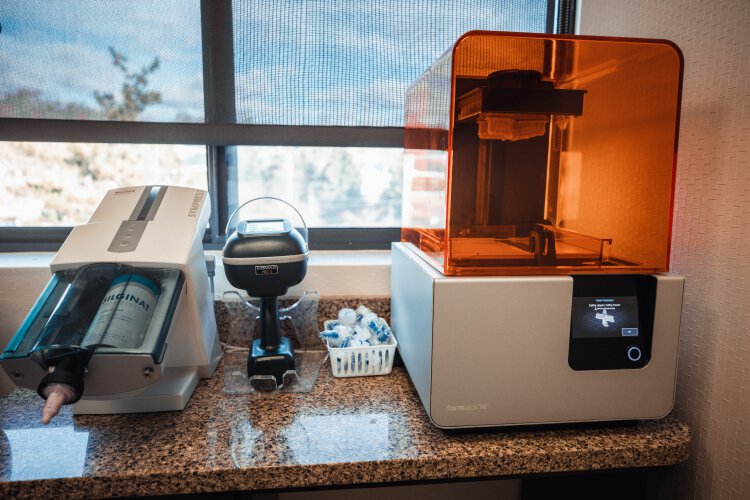When talking about TMJ (temporomandibular joint disorder), we usually talk about the physical symptoms that we can see, hear, and feel. But TMJ has other impacts, too. Often overlooked are TMJ’s signs and effects on our mental well-being. While some may think that psychological symptoms aren’t ‘physical,’ in reality, physical things are going on in our brains that cause discomfort and emotional instability. Read on and learn about the mental health consequences of untreated TMJ and what you can do to alleviate these symptoms and take your life back.
TMJ and Depression
An astounding 17.3 million adults in the US are affected by depression. This high number has many factors, all of which are not caused by or an effect of TMJ disorder. However, depression is an unwelcome constant companion for those who have TMJ. Chronic pain in your jaw joint can cause depression, and depression can cause chronic pain.
The pain that TMJ causes can be debilitating. It can cause you to avoid social and professional interactions, lose interest in your favorite hobbies, and, if it’s terrible enough, lose sleep. The good news is that TMJ treatment can help relieve your depression. With TMJ treatment, your neuromuscular dentist can ease your chronic pain.
Just like depression can be a consequence of untreated TMJ, TMJ can be a consequence of untreated depression. Depression is a stressful illness that can cause you to begin grinding and clenching your teeth. You’ll likely start to notice something is wrong because you’ll get a sore jaw and headaches. During the day, it’s easier to stop clenching and grinding your teeth (bruxism). However, at night, it’s much harder to curb without intervention. This type of TMJ is called myofascial pain disorder. The overuse of the muscles surrounding your jaw joint is causing pain, inflammation and pushing your jaw out of alignment. Treat your depression and TMJ to find relief from both.
TMJ and Anxiety
The Oxford English Dictionary defines anxiety as “A feeling of worry, nervousness, or unease, typically about an imminent event or something with an uncertain outcome.” People experience anxiety daily, and some anxiety is normal. For instance, when walking along a jagged cliff, one should feel some anxiety. But anxiety becomes a mental illness when it interferes with daily activities. Anxiety can take over your life, and it can cause and be caused by TMJ disorder.
When anxiety causes TMJ disorder, it happens the same way as TMJ and depression. Anxiety can cause you to grind your teeth and clench your jaw. Inflammation from overuse brings about a misalignment in your jaw and the resulting pain. Treat your anxiety and TMJ disorder to find relief.
TMJ has alarming symptoms that can trigger anxiety. Ringing in your ears, locked jaw, headaches, vertigo, and tingling in your fingertips can allow anxiety to spring up, especially when you don’t know that TMJ is causing these symptoms. TMJ and anxiety are two different disorders that can cause one another and exacerbate one another. In a vicious and unpleasant circle, TMJ symptoms can cause anxiety which can cause grinding, more anxiety, and more TMJ symptoms. The best thing to do is to treat your TMJ and your anxiety simultaneously since it’s hard to tell which one caused which.
TMJ and Stress
In many ways, stress can be the precursor to anxiety and depression. Of course, it doesn’t always happen that way. When you feel stressed, you feel overwhelmed and unable to deal with the stressor. It’s a pervasive feeling in the US. A ValuePenguine survey found that 78% of Americans feel stressed at least one day in a typical week.
Stress and TMJ have a parallel relationship to TMJ and depression and TMJ and anxiety. They can cause each other and aggravate one another.
What You Can Do
The best thing you can do to treat TMJ, depression, anxiety, and stress is seek treatment from a mental health professional and your TMJ dentist. However, you can do things to find some relief while getting your appointments scheduled and aid your treatment.
Self Care for TMJ
- Moist heat for a dull, throbbing pain
- Cold packs for sharp pain
- Eat soft food and take small bites
- Anti-inflammatory medication
Self Care for depression, anxiety, and stress
- Exercise daily
- Meditate
- Spend 30 minutes each day doing something you enjoy
- Get some fresh air
- Seek interaction with friends and family
TMJ Treatment
Are you concerned that you may have TMJ disorder? Schedule an appointment with Dr. Marlen Martirossian at Marlen Elite Dental Wellness for an evaluation and treatment. Treating your TMJ can ease your pain and lessen stress, anxiety, and depression. Take your life back today, call (201) 880-6736 or contact us online.


















